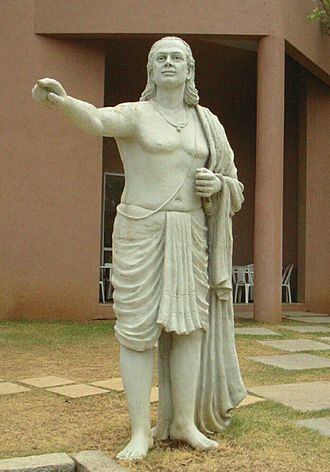Thomas Babington Macaulay is said to be the father of education of the Indian subcontinent. He wanted to create a pool of Indians who would be able to serve British interests and be loyal to them. This class would be
“Indian in blood and colour, but English in tastes, in opinions, in morals and in intellect.”
Macaulay wanted the government to spend money only on imparting western education and not on oriental education. He advocated the shutting down of all colleges where only eastern philosophy and subjects were taught.
He wrote in his book Minute on Indian Education,
“A single shelf of a good European library was worth the whole native literature of India and Arabia.”
Here's some Indian and Arab scientists who changed the world.
Arya Bhatt
Aryabhatta was a 5th-century Physicist, Mathematician, Astronomer, and Astrologer from the classical age of Indian Astronomy and Mathematics.
The number "Zero" was born by this great scientist. He calculated the numerical value of Pi (π) up to four decimal places centuries before Johann Heinrich Lambert
He is also considered as the Father Of Astronomy. He advocated the Heliocentric Model Of The Solar System and rejected the orthodox geocentric view that earth is immovable. He hypothesized that the Earth revolves around the Sun and rotates on its axis creating day and night each day.
Musa Al-Khwarizmi
Musa Al-Khwarizmi was a Persian polymath. He produced widely influential works in mathematics, astronomy and geography. Al-Khwarizmi's popular treatise on algebra (Compendious Book of Computation by Completeness and Balance, c. 813–833 CE) presents the first systematic solutions of linear and quadratic equations.
He has been described as the father of Algebra because he was the first to treat algebra as an independent discipline and introduced the methods of "reduction" and "balancing".
The word Algebra itself comes from the title of his book "Kitab Al-Jabr" which means "complete" or "rejoining".
In the 12th century, the Latin translation of his textbook on arithmetic "Algorithmo de numero indorum", which codified various Indian numerals, introduced the decimal positional number system to the Western world.
Sage Sushruta
Sage Sushruta is considered as the Father of Indian Medicine and the founding Father of Plastic Surgery. He was born somewhere between 1200 BC-600 BC.
He wrote a book named Sushruta Samhita where he wrote the correct description of different types of surgery.
 |
| Credit: Wikimedia Commons |
He is one of the first people to perform different kinds of surgery like cosmetic surgery, cataract surgery, or even plastic surgery.
Jabir ibn Hayyan
 | |
|
Jabir ibn Hayyan was the purported author of an enormous number and variety of works in Arabic, often called the Jabirian corpus. Jabir's works contain the earliest known systematic classification of chemical substances and the earliest instructions for extracting an inorganic compound from organic matter by chemical means.
His works contain some of the earliest surviving Shi'ite pedagogic, soteriological, and imamological doctrines, which Jabir presented as originating from his alleged master, the Shi'ite imam Ja'far al-Sadiq.
Some of his works were translated into Latin under the name Geber, and in 13th-century Europe an anonymous writer, commonly known as Pseudo-Geber, began producing alchemical and metallurgical texts under this name.
Bhaskaracharya
Bhaskaracharya was a 12th century Indian mathematician and Astronomer. He introduced the concept of graviry 500 years before Newton. In the fourth part of his book “Siddantha Shiromani” he explained the force of gravity.
Objects fall to Earth due to Earth's a force of attraction by the earth.. Hence due to this attraction the earth, planets, constellations, moon and sun are held in orbit.
Sources
“Aryabhata - Wikipedia.” Aryabhata - Wikipedia, en.wikipedia.org, 1 Mar. 2017, https://en.wikipedia.org/wiki/Aryabhata.
- “Jabir Ibn Hayyan - Wikipedia.” Jabir Ibn Hayyan - Wikipedia, en.wikipedia.org, https://en.wikipedia.org/wiki/Jabir_ibn_Hayyan. Accessed 27 Aug. 2022.
- “Muhammad Ibn Musa Al-Khwarizmi - Wikipedia.” Muhammad Ibn Musa Al-Khwarizmi - Wikipedia, en.wikipedia.org, 7 Oct. 2017, https://en.wikipedia.org/wiki/Muhammad_ibn_Musa_al-Khwarizmi.
- “Sushruta - Wikipedia.” Sushruta - Wikipedia, en.wikipedia.org, 15 May 2021, https://en.wikipedia.org/wiki/Sushruta.
- Narayanan, Nayantara. “Newton Discovered Gravity, Even If He Stood on Aryabhata’s Shoulders to Do So.” Scroll.In, scroll.in, 24 Feb. 2015, https://scroll.in/article/709070/newton-discovered-gravity-even-if-he-stood-on-aryabhatas-shoulders-to-do-so.
- “Thomas Babington Macaulay Presented His Minute on Indian Education on February 2, 1835 - This Day in History.” BYJUS, byjus.com, 1 Oct. 2020, https://byjus.com/free-ias-prep/this-day-in-history-feb02/#:~:text=Macaulay%20wanted%20the%20government%20to,philosophy%20and%20subjects%20were%20taught.

.png)



0 Comments